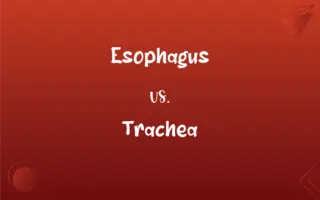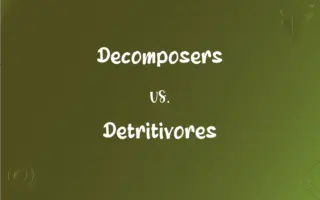Pixie vs. Fairy: What's the Difference?
Edited by Aimie Carlson || By Harlon Moss || Updated on June 7, 2024
A "pixie" is a small, mischievous, and often playful creature from British folklore, while a "fairy" is a mythical being or spirit, often depicted with wings and possessing magical powers.

Key Differences
"Pixies" are specifically known in the folklore of the British Isles, particularly Cornwall, as little tricksters who love to play pranks on humans. In contrast, "fairies" have a broader mythological presence, appearing in many cultures worldwide, and are typically considered guardians of nature.
While "pixies" are often imagined as wingless and closely associated with the moorland areas, "fairies" are frequently portrayed with delicate wings and can reside in various realms, from forests to fairyland.
In some tales, "pixies" have been described to lead travelers astray with their playful antics, delighting in their mischief. "Fairies", on the other hand, might bestow gifts, curses, or wishes upon humans, reflecting their dual nature of benevolence and malevolence.
"Pixies" are often differentiated from "fairies" in terms of their physical appearance. While both are diminutive, "pixies" might be imagined with pointed ears and a more earthly demeanor. "Fairies" are frequently described as ethereal and radiant, sometimes glowing with an otherworldly light.
To put it simply, while both "pixies" and "fairies" occupy the pages of folklore and are creatures of magic and wonder, their origins, characteristics, and behaviors differ, making each unique in the tapestry of mythological beings.
ADVERTISEMENT
Comparison Chart
Origin
Mainly British Isles, especially Cornwall
Found in various cultures worldwide
Appearance
Often wingless, with pointed ears
Usually depicted with wings
Habitat
Moorland areas, underground
Forests, fairyland, other magical realms
Nature
Mischievous, playful
Can be benevolent or malevolent
Interactions
Known to play pranks on humans
May grant wishes, bestow gifts, or cast curses
ADVERTISEMENT
Pixie and Fairy Definitions
Pixie
A small, playful creature from British folklore.
The child believed a pixie had hidden his shoes.
Fairy
A mythical being often endowed with magical powers.
The fairy granted her three wishes.
Pixie
A mischievous being, known for leading travelers astray.
She laughed, saying it was the work of a pixie when the map disappeared.
Fairy
A creature from folklore that interacts with humans.
The old tale spoke of a fairy who cursed the unkind queen.
Pixie
A wingless mythological creature with pointed ears.
She dressed up as a pixie for the folklore festival.
Fairy
A symbol of wonder and enchantment in stories.
Her grandmother used to tell fairy tales where the fairy was the heroine.
Pixie
An emblem of harmless mischief in legends.
Every misplaced item in the house was jokingly blamed on the pixie.
Fairy
A small spirit, typically with wings, known to guard nature.
She believed every flower was protected by a fairy.
Pixie
A representative of earthy magic in some tales.
The villagers told tales of pixies guarding the ancient stones.
Fairy
A radiant being often residing in a magical realm.
He dreamed of visiting the fairy kingdom beyond the woods.
Pixie
A fairylike or elfin creature, especially one that is mischievous; a playful sprite.
Fairy
Offensive Slang Used as a disparaging term for a gay man.
Pixie
Playfully mischievous.
Fairy
An imaginary being in human form, depicted as clever, mischievous, and possessing magical powers.
Pixie
A playful sprite or elflike or fairy-like creature.
Fairy
The realm of faerie; enchantment, illusion.
Pixie
(slang) A cute, petite woman with short hair.
Fairy
A mythical being with magical powers, known in many sizes and descriptions, although often depicted in modern illustrations only as a small sprite with gauze-like wings, and revered in some modern forms of paganism.
Pixie
An upper-atmospheric optical phenomenon associated with thunderstorms, a short-lasting pinpoint of light on the surface of convective domes that produces a gnome.
Fairy
An enchantress, or creature of overpowering charm.
Pixie
A butterfly of the genus Melanis.
Fairy
A male homosexual, especially one who is effeminate.
Pixie
(folklore) fairies that are somewhat mischievous
Fairy
A member of two species of hummingbird in the genus Heliothryx.
Pixie
Creeping evergreen shrub having narrow overlapping leaves and early white star-shaped flowers; of the pine barrens of New Jersey and the Carolinas
Fairy
A legendary Chinese immortal.
Fairy
Like a fairy; fanciful, whimsical, delicate.
Fairy
Enchantment; illusion.
The God of her has made an end,And fro this worlde's fairyHath taken her into company.
Fairy
The country of the fays; land of illusions.
He [Arthur] is a king y-crowned in Fairy.
Fairy
An imaginary supernatural being or spirit, supposed to assume a human form (usually diminutive), either male or female, and to meddle for good or evil in the affairs of mankind; a fay. See Elf, and Demon.
The fourth kind of spirit [is] called the Fairy.
And now about the caldron sing,Like elves and fairies in a ring.
Fairy
An enchantress.
No goblin or swart fairy of the mineHath hurtful power over true virginity.
Fairy
Of or pertaining to fairies.
Fairy
Given by fairies; as, fairy money.
Fairy
Small, human in form, playful, having magical powers
Fairy
Offensive terms for an openly homosexual man
FAQs
Are pixies always mischievous?
While pixies are often depicted as playful tricksters, not all tales portray them as mischievous.
Are pixies and fairies considered good or evil?
Both pixies and fairies can have dual natures; they can be benevolent or mischievous based on the tale.
Do fairies always have wings?
While many depictions show fairies with wings, some folklore presents them as wingless.
Are fairies immortal?
In many tales, fairies are considered ageless or immortal, living far longer than humans.
Why are pixies often associated with laughter?
Their playful and mischievous nature in folklore often links pixies with merriment and laughter.
How are fairies born?
The birth of fairies varies by tale; some stories suggest they sprout from nature, while others have more mystical origins.
Are there male and female pixies and fairies?
Yes, both male and female versions of pixies and fairies exist in various tales and depictions.
Are fairy tales true?
Fairy tales are fictional stories meant for entertainment or imparting lessons, not factual accounts.
Are pixies exclusive to British folklore?
Pixies are predominantly known in British folklore, especially in regions like Cornwall.
Do pixies have a ruler or queen?
Some stories might depict a hierarchy among pixies, but it's not a universal trait in all tales.
Is the "pixie cut" hairstyle inspired by pixies?
Yes, the "pixie cut" is a short hairstyle, reminiscent of depictions of pixies in folklore.
Do pixies have any specific powers?
Pixies are often associated with playful pranks and sometimes possess minor magical abilities.
Do pixies live in groups or alone?
Pixies are often depicted as social beings, living in groups or communities.
Are pixies related to other creatures like brownies or gnomes?
While all are magical beings, pixies, brownies, and gnomes have distinct characteristics and origins in folklore.
Can fairies change their size?
In some tales, fairies have the ability to alter their size or appearance.
What's a fairy ring?
A fairy ring is a naturally occurring circle of mushrooms, often linked to fairies in folklore.
What's a fairy godmother?
A fairy godmother is a fairy that acts as a guardian, often granting wishes, as seen in tales like "Cinderella".
Is Tinker Bell a fairy or a pixie?
Tinker Bell, from J.M. Barrie's "Peter Pan", is commonly referred to as a fairy.
What's the difference between a fairy tale and a folklore?
A fairy tale is a fictional story with magical elements, while folklore is traditional beliefs and tales passed through generations.
Can humans become pixies or fairies in legends?
Some legends and tales do speak of humans being transformed or even lured into the world of pixies or fairies.
About Author
Written by
Harlon MossHarlon is a seasoned quality moderator and accomplished content writer for Difference Wiki. An alumnus of the prestigious University of California, he earned his degree in Computer Science. Leveraging his academic background, Harlon brings a meticulous and informed perspective to his work, ensuring content accuracy and excellence.
Edited by
Aimie CarlsonAimie Carlson, holding a master's degree in English literature, is a fervent English language enthusiast. She lends her writing talents to Difference Wiki, a prominent website that specializes in comparisons, offering readers insightful analyses that both captivate and inform.






































































